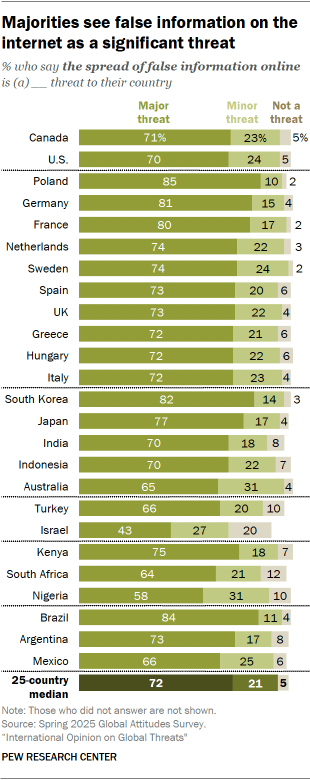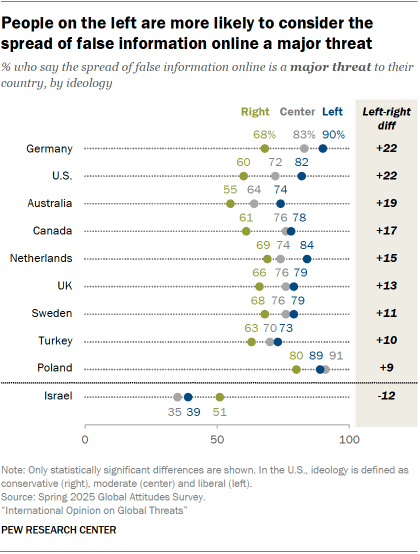- A median of 72% of adults across 25 nations say the spread of false information online is a major threat to their country. A median of 21% consider it a minor threat, and a median of 5% say it is not a threat.
- Concern about false information on the internet is widespread in both high- and middle-income countries, and has remained relatively stable over time. (Read Appendix A for more information on how we classify high- and middle-income countries.)
- Older people and those on the ideological left are particularly likely to see false information online as a major threat.

Majorities in 24 of the 25 countries surveyed see the spread of false information online as a major threat. Only in Israel do fewer than half of adults (43%) hold this view. An additional 27% of Israelis say false information is a minor threat, and 20% do not consider it a threat to their country.
Related: Widespread global public concern about made-up news
Views over time
We last asked about the threat posed by false information online in 2022. Since then, public perceptions in most places have not moved much. Of the 16 countries where this trend data is available, we see significant changes in six.
The share of adults who say false information is a major threat has grown in Poland (+20 points), Sweden (+10), Hungary (+9), France (+6) and Germany (+6). (In 2022, the Hungary and Poland surveys were conducted face-to-face; they are now conducted over the phone.) In Greece, the share with this view has shrunk 7 points, from 79% in 2022 to 72% today.
Views by age
In several countries, adults ages 50 and older are more likely than those ages 18 to 34 to see the spread of false information online as a major threat. This is the case in Argentina, Australia, Canada, Japan, Kenya, Poland, Sweden and the U.S.
But in Brazil and Turkey, the opposite is true: Older adults are less likely than younger adults to consider false information a major threat. In both countries, however, older adults are also slightly less likely to answer the question.
Views by ideology

In most countries, majorities across all ideological groups consider the spread of false information online a major threat. But in nine countries, people who place themselves on the ideological left are more likely than those on the right to say this.
Some of the biggest differences are in Germany and the U.S. For example, 82% of liberal Americans say the spread of false information on the internet is a major threat, compared with 60% of conservatives.
Here, too, Israel is an exception. It is the only country surveyed where people on the left are less likely than those on the right to see the spread of false information online as a major threat.
Views by support for populist parties
In several European countries, concern about the spread of false information online is considerably lower among supporters of right-wing populist parties than among nonsupporters. (Read Appendix B for more information on how we classify populist parties.)
For example, 55% of Germans with a favorable view of Alternative for Germany (AfD) say the spread of false information is a major threat, compared with 89% of those who have an unfavorable view of AfD.
We find similar gaps between supporters and nonsupporters of right-wing populist parties in Hungary, the Netherlands, Poland, Sweden and the UK. But Spanish supporters of Podemos – which is classified as a left-leaning populist party – are more concerned than nonsupporters about the threat of false information online (83% vs. 71%).




